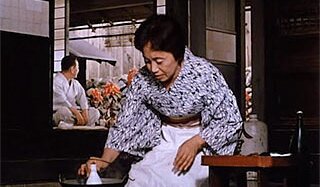|
|
| Ozu's remake of his own A Story of Floating Weeds (1934) is, like most of his work, straightforward, civilised and touching. There are untypical touches of humour in the theatrical scenes, and it is notably beautiful: cinematography is by one of Japan's finest, Kazuo Miyagawa, who only worked with Ozu this once. It's also rather long-winded. |
|
| YES |
|
| "The mood is the late Ozu mood: immaculately serene, quietly poignant; the color work is magnificent." |
| (Michael Wilmington, L.A. Times) |
|
| “Ozu [is] perhaps the most accessible and surely one of the most enjoyable Japanese directors for Western audiences... In the humor or sadness or generic truth of its vignettes... the cinema of Ozu provides the justification for its gentle and unassuming forms.” |
| (Roger Greenspun, New York Times ) |
|
| "This material could be told in many ways. It could be a soap opera, a musical, a tragedy. Ozu tells it in a series of everyday events. He loves his characters too much to crank up the drama into artificial highs and lows... His camera never moves. No pans. No tracking shots. There are not even any dissolves; just cuts between one composition and the next. This is very contemplative. We are prompted to look and involve ourselves, instead of simply reacting." |
| (Roger Ebert) |
|
| "One of Yasujiro Ozu's best... Lightly comic and magnificently photographed by the master Kazuo Miyagawa." |
| (Scheuer) |
|
| "Powerful drama is meticulously directed, solidly acted." |
| (Maltin) |
|
| "Filled with the most arrant propaganda for the left-wing theater...Kabuki fans of Japan severely attacked the film for its anti-Kabuki stand." |
| (Joseph Anderson & Donald Richie, The Japanese Film, 1982) |
|
| “The re-make gains enormously from the playing of Ganjiro Nakamura and Machiko Kyo and the stunning colour photography of the great Kazuo Miyagawa... the small alterations made by Ozu in this version, strengthening the end and introducing a different flavour to the scenes of the troupe at work.” |
| (Elkan Allan, N.F.T. Bulletin) |
|
|
|
